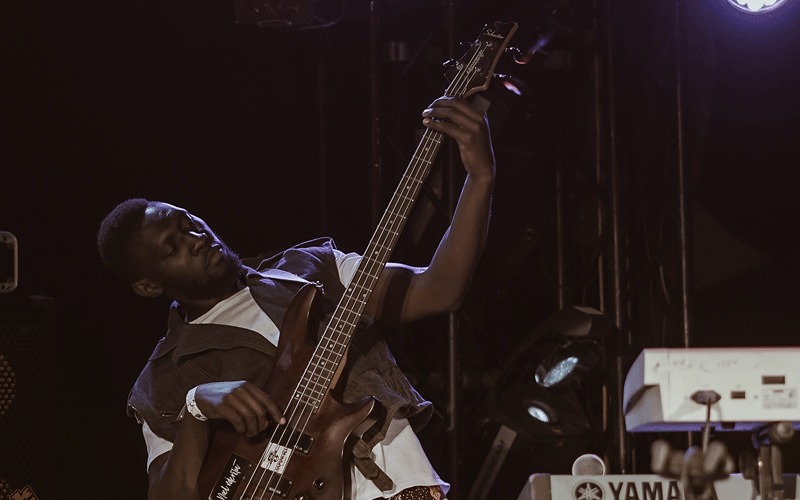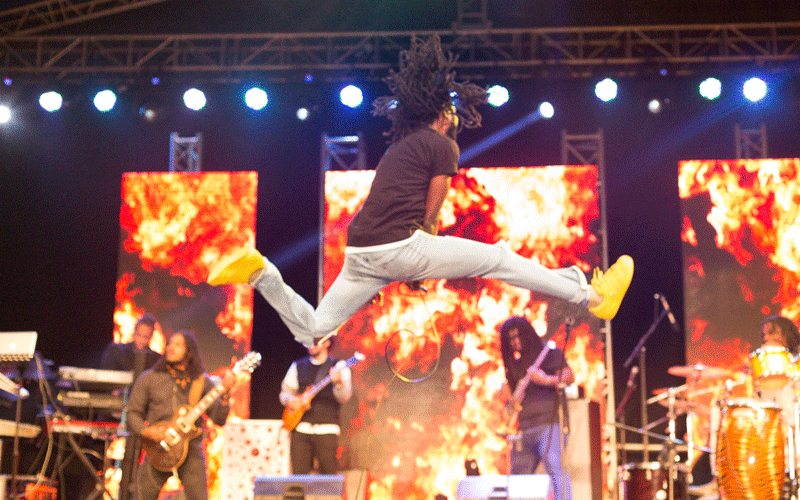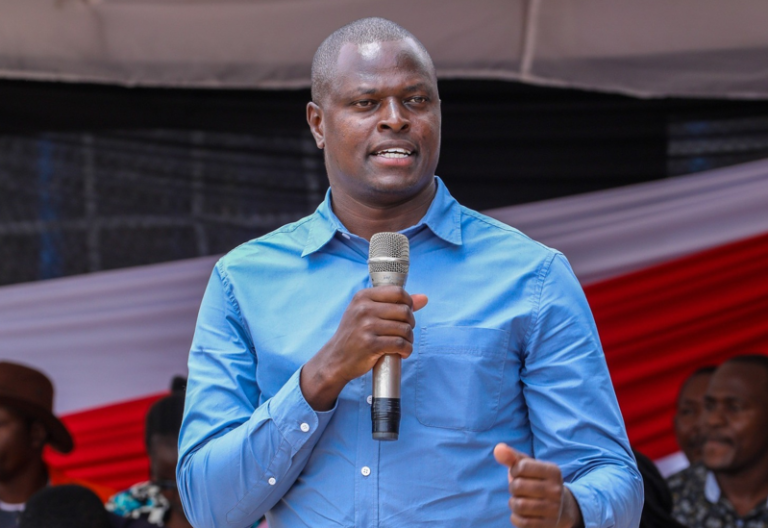All eyes on stage: How Kenyan concerts are made

We may not necessarily see everything that happens on stage. When we show up to be entertained, we rarely notice the myriad of things— good and bad— that entertainers undergo while working their crafts. The Spice team takes a look at what happens before the stage lights go on.
Revellers will show up at events, and once they end, go home praising or critiquing them.
What matters to most of them include whether the DJ rocked the party, if the hype man or MC did his duty, and importantly, whether the main acts were delivered as expected.
What many never get to know is how all players came together to pull off shows.
A performer’s life revolves around three Ss: studio, set and stage. The latter is always the focus point as it is where the magic happens.
Before they hit the stage, there are a number of activities and procedures that must be followed. Many variables come into play before the big day.
Kavutha Mwanzia-Asiyo, popularly known as Coach Kavutha, notes it is important to plan ahead.
“Before the material day, tonnes of hours of practice have been spent. A lot of work has been put in and some shows take even months just to put up. In fact, I’d estimate that 80 per cent of a show is spent in the preparation.
It is like a meal and before you start cooking, you need all your ingredients ready,” she says.
MC Kibunjah, who has been at his craft for eight years now, echoes the very sentiment. “It’s about preparation and rehearsals.
Before I get on stage, I ensure I am well prepared as far as mic checks and rehearsals go. Mic checks are key for any performer.

I have a deep voice and so, I need the highs and lows levelled because if not, I can’t communicate with my audience,” he adds.
For professional dancers such as Samuregz, some gigs require advance booking for adequate preparation. “I need time to create a choreography in line with the theme,” he says.
Focal point
Even with all key factors in place, an outstanding stage can bring an event to life— it is the reason most clients demand the setup reflect their theme and purpose.
Since the stage is the focal point of an event, it should be eye-catching enough to maintain the guests’ attention.
“Staging is all about using space wisely to express brand messaging and to enhance performances or speeches.
There are a few basic rules for making a stage functional. It needs to be easy to navigate for people using it.
To ensure the smooth running of stage performances and appearances, we always make sure we’ve created a simple layout that has a clear entry and exit point,” said Joshua Bosire, CEO JayB Events.
He insists the positioning of the stage is important, as it needs to be seen from every section of the event space to maximise guests’ experience.
With technology taking over, the stage must be lit, like literally. It must accommodate lighting fixtures, sound system, LED screens, entertainers and speakers, which might cost millions.
Location plays a major role into how events can be orchestrated. Deciding whether to hold the events indoors or out is an underrated factor.
Indoor vs outdoor
“It takes a lot of hard work and planning putting together a single show because you are trying to set standards and have longevity.
Outdoor events come with a lot of expenses such as licences, production, ambulances for emergencies and so many factors.

Indoor events are easier because above all you have the benefit factor of people’s safety first, and they already have most resources.’’ Musau Mumo, founder of Hip Hop event Shrap Night Depositions to Spice.
On top of that, perfectionism is involved in pulling off shows that bring in massive crowds.
“It takes practice, patience, discipline and passion, and a beautiful story with exceptional music to top it off.
Self-belief too because sometimes, we are the only ones who see a vision in its early stages and you have to believe in your vision and yourself well enough till others have no option than to believe in you,” Jamhuri Events show producer Tom Olang’o states.
However, on the day of performances, as the wise say, even the best laid plans often go awry.
In a recent event, Yes Bana hitmaker, Khaligraph Jones, got angry with the DJ for disrupting his flow.
“Normally, these are some challenges we face on stage. On that particular day, the DJ was scratching in the middle of a song and I wasn’t amused.
This is why I have a rider on my contract to have my personal DJ,” Khaligraph told Spice.
MC Kibunjah is also not a stranger to mishaps on stage; he once fell while performing.
“It was in 2016 at a university. The makeshift stage panels split and I fell through,” he laughed.
But even as he was under the stage, he kept going. “You never stop your performance.
I continued to charge the crowd with jibes like ‘Weka mikono chini, nakuja (put your hands down, I’ll be up shortly)!’ and they laughed, but went on. I have learnt to use everything to my advantage.
Performing is not a movie; there’s no time to rewind; the show must go on,” MC Kibunjah said.
Before an artist hits the stage, their minds need to be at ease. According to the OG as he fancies himself, different events have different levels of preparations for artistes.
“When we have these big concerts or corporate events, the contract normally includes rehearsals that could take days.
These are the instances when I must have my personal DJ on the set and we do our thing.
However, it does not mean I can’t play with the resident DJ, however, most are normally distracted by the crowd or people who get on stage,” he explains.
To put up a seamless show, Samuregz ensures his contract is up to par. “I avoid distractions that might come up, thus my contract has me covered.
Nonetheless, even with all these factors in check, I take time to prepare myself. Usually, I listen to music and because of dress rehearsals, I know the team I am working with and get the show on the road,” he says.
MC Kibunjah is not shy about anxiety that grips performers when they are about to go on stage.
“Tension comes with the territory. At one Totally Sold Out concert and a Groove Tour, I was so tensed and anxious, but usually, I sing to myself and respond as my own audience would.
I psyche myself completely and get my head in the game. When on stage, I am in the zone and I give it my all. It’s all in a day’s work,” he explains.
Stage managed
Although line-ups are in place, some artists get jilted at the last minute. Event organisers can reject artistes over different reasons including lack of radio play, despite them having niche market and immense following.
“Kenyan events promoters certainly try to uphold policy of filling seats and getting as many people to attend a concert.
They have costs to meet, so they do their best to attract crowds to fulfill their obligation.
The only issue is that musical line-ups often come with inconsistency challenges, in that the main act have to put up with a confused line-up preceding them,’’ says artiste Tetu Shani.
He insists curtain raisers must complement the main show. “Event organisers should pay attention and have a cohesive line-up consistent to the main act, which means show curation has to be designed to create an experience for everyone,” the two-time winner of best band says.
Even so, event organisers and managers insist they normally crosscheck a number of things before settling on a performer.
“There are standards that must be adhered to, especially on who can fit where and when.
There are artistes who are not good at live performances— something that is important for all entertainers,” said Big Ted.
For a successful event, organisers get professional stage managers. They are important persons on the D-Day; not only are they the eyes and the ears of the party, but also the ones who run the gig.
“The stage manager moderates the programme and one top attribute is that he must be quick on his feet. His knowledge on things such as crowd reaction and reading the mood of the event is key to the success of any event,” Big Ted said.
When all is said and done, Coach Kavutha emphasises on importance of having a contingency plan in case things go awry.
“If the lighting or sound engineering goes wrong, we can change tack and keep the show going. Whatever went wrong on stage will be discussed after all is said and done,” she advises.








